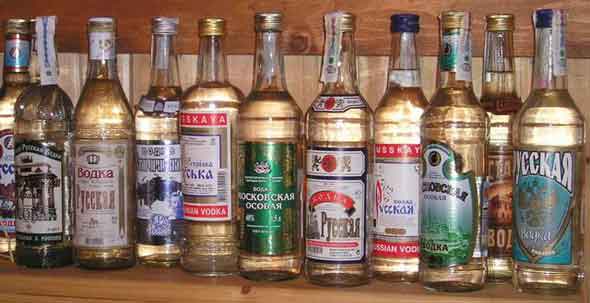How To Stop Drinking Alcohol
 There are dozens of different theories on how to quit drinking alcohol. What I’m sharing is what worked for me, and what I believe is the best way to approach recovery.
There are dozens of different theories on how to quit drinking alcohol. What I’m sharing is what worked for me, and what I believe is the best way to approach recovery.
What works for me might not work for you, but I believe that there are some fundamental problems with many of the traditional approaches to recovery. I believe that addressing these problems is the key to successful recovery.
Why Do So Many People Fail In Recovery?
There are lots of reasons that retention and success rates are so low for 12 step programs.
I know there are some people who feel that AA did little for them. I also know people who benefited tremendously from AA. I do not think the high relapse rates for AA and other recovery programs are because the programs don’t work. They definitely work for some people, but they’re not necessarily for everyone.

Any recovery program can work if you take massive action and stick to the steps. Don’t dismiss them because you read something negative, if you’re on the fence about AA, just try it out for yourself. It might be the best decision you’ve ever made in your life. For more on this, you can read my post on AA success rates.
Getting Sober Is NOT Easy
It may seem obvious, but probably the biggest reason that failure rates appear high in recovery programs, is that getting sober is damn hard. There’s no getting around it.
No matter what program of recovery you choose, most of the people in the program will relapse at some point. Successful, long-term recovery requires massive action on the alcoholic’s part. Whether you do it within the traditional boundaries of AA, or following a more unconventional path, it might take more than one try to get it right.
What’s The Secret To Successful Recovery?
The truth is no single best way to quit drinking, there is no magic bullet.
If you felt disappointed when you read the last sentence, ask yourself why. Is it because you wanted an easy solution or a quick fix?
There may be no single best way to quit drinking, but any recovery method with a long-term success rate has one thing in common – they all require massive action and change on the part of the alcoholic. Unless you make a massive effort to remove alcohol from your life for good, you will fail.
There Is No “One Size Fits All” Treatment
But while there’s no magic bullet, there are also many different paths to successful recovery.
Some people benefit from the structure, social dependency, and quasi-religious nature of 12 step recovery programs. Others don’t need group therapy or counselling, but they do need to be shown ways to make positive changes in their lives.
One thing that most paths to successful recovery share, is that they’re focused on long-term personal growth strategies, rather than short term tactics.

So What Should You Do To Quit Drinking?
I do think that far too many traditional recovery programs teach relapse prevention techniques and coping skills that don’t address the root cause of relapse.
Relapse is triggered by emotional upheaval and driven by powerful internal desires to drink. When this happens, alcoholics don’t need intellectual techniques to prevent relapse, because they simply won’t work. The alcoholic’s rationale side shuts down, and all they want to do is get a drink. Before they know it, they’ve relapsed.
In order to combat this powerful emotional drive to drink, alcoholics need to develop emotional counter-balances in order to overcome the powerful need to self-medicate.
Strategies For A Holistic Approach To Recovery
Whatever outside support you seek to pursue, I firmly believe that long-term recovery depends on personal growth. You need to work daily to improve your life and protect yourself against the dangers of complacency. While you can and should seek support to help you in recovery, this is something you ultimately have to take personal responsibility for.
1. Action. Action. Action
Its easy to sit there and think about what you’ll do “tomorrow”. Its much harder to actually take action right now to change your life.
If you’ve relied on alcohol for physical and emotional release for years, then its going to take a massive, massive effort on your part to rebuild a life without alcohol. You’re going to have to:
- Learn to have fun without alcohol
- Learn how to process your emotions without alcohol
- Find true meaning in your life that makes your sobriety worthwhile
- Learn how to communicate openly and honestly
- Learn how to avoid relapse in a society that loves to drink
- Learn how to build positive, uplifting relationships
- Learn to cut out toxic relationships from your life
None of these are easy, all of them will require a ton of effort on your part, and you definitely won’t see results overnight. If you’re not ready to take action every single day to slowly move forward, you’re going to have a really rough time.
2. Seek Medical Supervision When Detoxing
While you can certainly stop drinking alcohol on your own without relying on a 12 step program or a counsellor (although its certainly something worth considering), the actual process of detoxing from alcohol can be extremely dangerous.
Alcohol detox only takes around 2-4 days on average, but if you’ve abused alcohol for years and years, there is a risk of serious side effects, including death. Do not mess around, check yourself into an in-patient alcohol treatment facility and let professionals help you safely detox.
3. Get Physically Healthy
You’ve spent years abusing your body, now its time to build it back up. You can’t live a healthy lifestyle and be an alcoholic at the same time, the two are simply not mutually compatible. Start taking up physical activities that you enjoy, educate yourself about nutrition, and quit any other vices that may be impacting your physical health, such as smoking.
Exercise is so powerful that some addicts and alcoholics have managed to quit simply by channeling their focus, energy, and meaning in life towards living a healthy lifestyle. A good hard workout can put you in a powerful, meditative state, and healthy living can be a code through which you can live your life. Healthy living can help you learn about yourself, and it can also help you meet many amazing people who share similar healthy lifestyle goals.
Furthermore, getting in shape can be a tremendous boost to your self-esteem. Better self-esteem will help you get rid of negative thoughts and reduce anxiety. Real self-esteem can be a stabilizing force in your life.
4. Build Up Your Self Esteem
You’ve spent years with the self-loathing and pity that often comes with being an alcoholic. Its part of the reason quitting is so hard – the feelings of anxiety, self-loathing, and self-pity creates a desire for self-medication, and the consequences of alcohol abuse batter away at the alcoholic’s self-esteem, driving the need for more alcohol and continuing the spiral downwards.
Building up a strong base of self-esteem will serve as a protective barrier against a lot of the emotional upheaval that can trigger relapse. Developing a base of self-esteem won’t happen overnight, but here are some ways you can get started:
- Find friends who love you for who you are
- Get into physical shape – When you look more strong and confident, people respond better to you. When people respond better to you, you feel more confident.
- Try new activities – Look for hobbies and activities that push your boundaries. Do interesting things. Travel to new places.
- Spend time with yourself – Spend time each day exploring your thoughts and becoming comfortable with who you are
- Help other people – This might mean volunteering in your community, but it also means being a good all-around person in your daily living.
- Always seek personal improvement – But don’t let your status determine your self-worth
5. Cut Out Toxic Relationships & Build Uplifting Ones Instead
This means distancing yourself from other addicts and abusive alcoholics, but it also means distancing yourself from negative people in general. You don’t need to be around people who will bring unneeded drama and negativity in your life. You don’t need people around who will lie, cheat, or steal, and you certainly don’t need people who won’t have your back when stuff hits the fan.
Try to be around people who are actively seeking to improve their own lives. Surround yourself with the kind of people you want to become.
6. Don’t Rationalize Complacency
There will be a point in recovery where you will look back and marvel at how far you’ve come.
This is not the time to rest on your laurels. Complacency tends to set in when we’re at our strongest. Keep pushing yourself to improve and grow as a person, even if you’re happy with what you’ve achieved so far.
7. Be Grateful For What You Have
When you’re grateful for what you have, relapse becomes the furthest thing on your mind. Take the time to appreciate what you have, even if it doesn’t feel like you have much.
Personally, I like to write down 5 things I’m grateful for every day. Some days I have a lot to be grateful for, other days I stick with the things I usually take for granted, like having a roof over my head, relatively good health, or even just a fresh breath of crisp morning air.
8. Support Groups Can Be Helpful – But Don’t Use Them As A Crutch
While I think being in contact with others in recovery is helpful, I also think its dangerous to rely on a social crutch in order to avoid relapse.
Don’t be afraid to seek help to stop drinking alcohol. Look for support in others to strengthen yourself, but be ready to stand on your own two feet.
9. Find Meaning In Your life
We’re born, we live, and we die. One of the common struggles of the human condition is that we all have to find meaning in this short time we have on earth. Figuring out what we need to do during our precious time on earth is a challenge that has faced every human being since the dawn of time.
You don’t need to find your calling overnight, but day by day – work on building a life that you want to live. Meaning can come from religion, spirituality, helping others, family, the pursuit of knowledge, or even just the pursuit of new experiences. Set goals and go out and make them a reality.
More Articles On Alcoholism
Hopefully, you have a better idea of how to approach recovery and quitting alcohol.
It’ll be a long road and you might falter along the way. But don’t lose heart because you relapsed once or twice. If you do relapse, make sure to take massive action to ensure that your next attempt at recovery will be a success.




